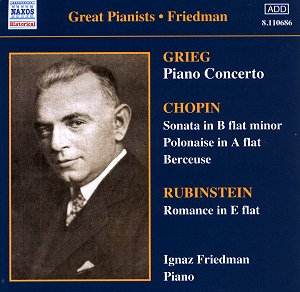I recently reviewed the first in Naxos’s Friedman series
which began in 1923 when the Cracow-born pianist was a mature musician
of forty-one. The same dazzling array of talents that manifested themselves
in those late acoustics is equally apparent here – prodigious virtuosity,
stunning attacks, huge dynamic ranges, a compulsively roguish sense
of rubato, exceptional command of dance rhythms, and above all a gargantuan
and explicitly Romantic temperament. The second volume again is laden
with Chopin, the Mazurkas at least being known Friedman specialities,
and covers the period of exactly one year, from 1 March 1927 to March
1928. There were flurries of recording activity – 1st and
2nd March 1927 which saw the first eight items safely recorded
– and again around 9th and 10th February 1928.
On all these occasions we are witness to extravagant technical accomplishments
co-existent with powerfully personalised and romanticised interpretative
decision making and it would be fair to add, quirks. We can also hear
Friedman’s only published Concerto performance, that of the Grieg; an
Emperor Concerto with Henry Wood was never issued.
Much here is ravishing; equally things that are so
personalised as to be more problematical even though the textual emendations
and lavish rubati were all part of the virtuoso arsenal. The disc opens
with alternative takes of pieces heard on volume one; his own Elle
danse is laced with luscious rubati, the glittering right hand roulades
adding a layer of infectious charm to a salon piece. The Allegretto
of the Moonlight is extremely slow however and the Presto
agitato simply garbled at the speed he takes it. The freely applied
rubati reinforce Friedman’s stance as a Romantic par excellence. When
it comes to Chopin he is outsize and heroic in the A flat Polonaise
– exhilarating if also somewhat exhausting. He is exceptionally fast
in the presto of the B flat Sonata (as with the Moonlight only
two movements are here) – really too fast for proper articulation and
clarity. The Berceuse, perhaps because simpler, goes rather better and
is not subjected to anything like the same degree of rhetorical romanticism.
He is equally adept at Rubinstein’s once ubiquitous Romance, resisting
the temptation to apply lavish designs upon it and Suk’s Minuet, from
the Op. 21 Suite, survives Friedman’s characteristic injection of high
adrenalin rubati – emerging playful and pert. The centrepiece of the
collection is the Grieg Concerto accompanied by an unidentified French
orchestra and conducted by Phillipe Gaubert. Dating from late 1927 the
sessions took place in Paris and feature more of Friedman’s incendiary
pianism. The first movement very much observes the Allegro molto moderato
marking, sounding slower and more tension filled as a result. Friedman
adopts a somewhat capricious profile here, launching exocet bass notes
in the cadenza and a generally high-octane approach to dynamic variance.
The second movement is temporarily at least vitiated by tremulous horn
playing but equally there’s pounding vigour from the soloist; I wouldn’t
call it over subtle. Some sticky moments intrude in the finale as well
with its flaring first trumpet and drama inflated drive. But as ever
with Friedman his colossal personality co-exists with performance idiosyncrasies
that are as much intriguing as they are perverse.
The transfers are once more by Ward Marston and are
highly successful; notes are by Jonathan Summers. Friedman lives again
in all his bold, vexatious glory.
Jonathan Woolf

